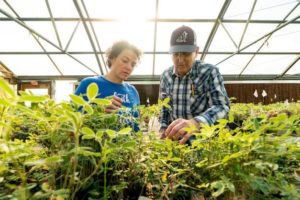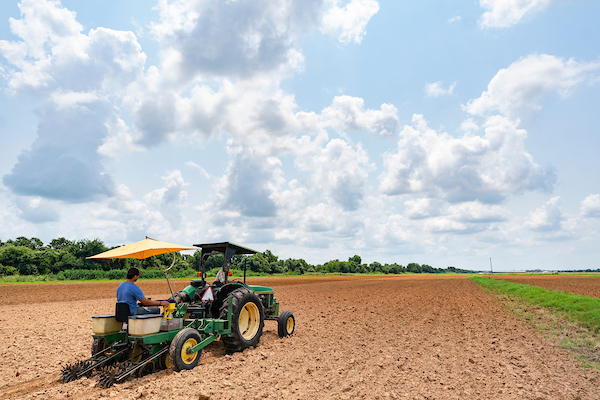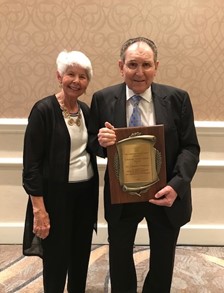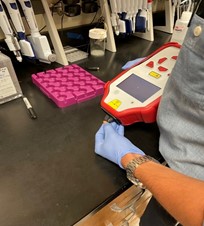Volume 1 / Issue 1 / February 2022
In this issue
Kicking Things Off | Drought Transcriptomics | 2021 Ice Storm | Creating a Superfood | Other Projects | Contact
Please enjoy our inaugural newsletter to discover initiatives and successes of the Charles Simpson Endowed Peanut Program at Texas A&M AgriLife Research. Our goal is to keep you informed about exciting projects and strive to continue Dr. Simpson’s vision at the forefront in peanut research and development.
Love PEANUTS? We do too!
The peanut breeding and genetics program in Stephenville has a rich history dating back over 75 years. Today, we are focused on using the latest technologies to produce improved peanut cultivars. We concentrate on cultivated peanut variety development, wild species gene introgression, trait enhancement, and germplasm maintenance.
Kicking Things Off
The Charles Simpson Endowed Research Fund was established to preserve a legacy created by Dr. Charles E. Simpson for his tireless efforts to collect, preserve and utilize wild species peanuts for the peanut industry across Texas, the US, and the world. Dr. Simpson has spent a lifetime traveling to remote areas in South America to gather and assemble one of the most comprehensive collections of wild peanut germplasm in the world. He has utilized this collection to develop peanut varieties resistant to Root-knot nematode as well as many other pests and diseases. Dr. Simpson’s extended career has created over 23 varieties and seven germplasm releases.
We are proud to announce in 2021 at the USA Peanut Congress held in New Orleans, LA, Dr. Simpson was awarded the Lifetime Achievement Award for his 54 years of service to the peanut industry by the American Peanut Council. From 1980 to 2004 Dr. Simpson made 28 expeditions to South America, and though he retired in 2003, he continues to oversee the care and use of the collection on a daily basis.
Drought Transcriptomics

We continue to use our wild species to search for new drought tolerance traits. In 2021, the Peanut Research Foundation provided funding for our program to conduct a drought study on two different wild species peanuts. One of these species comes from the dry Northeastern tip of Brazil that receives less than four-inches of rain per year. During the study we stopped watering the plants for seven days and took leaf and root samples from which ribonucleic acid (RNA) was extracted by Drs. Jeff Brady and Biyi Obayomi at the Texas A&M AgriLife Research and Extension Center Stephenville. The samples were sequenced and analyzed for genes that were active during drought stress that could be used for targeted breeding

2021 Ice Storm
In February 2021, Texas was hit with a crippling ice storm that required rolling power outages across the state for five days. As a result, our dedicated staff and students operated generators 24-hours per day to ensure peanut preservation. We would like to send a thank them for their continued dedication and perseverance!
Creating a Superfood
One of our most exciting projects embarked in 2021 – We are striving to make peanuts a superfood. Over the next 50-years we will find ourselves facing a critical food shortage, and Texas A&M AgriLife Research is developing new and innovative methods of peanut variety development to feed an ever-growing population. Producing enough food is one problem; however, another related issue is logistically sourcing the peanuts to people around the world…Within our research, we begin to ask, “What if there is one food source that provides all essential nutrients a person needs to survive, could be grown large scale on every continent of the world (except Antarctica), and sustains a long shelf life?” The unassuming peanut ALMOST fits the bill.
Did you know that peanuts contains adequate daily recommendations of 7 of the 9 essential amino acids required to be considered a complete protein source? Essential amino acids are the minimum number of amino acids the body needs to produce everything needed to remain healthy. Superfood status is given when a food contains all the necessary recommended daily allowances of these building blocks for the body’s nutritional needs. Preliminary research indicates variation in multiple nutritional components is present in wild and exotic peanut germplasm, and may be developed to provide to people who desperately need a reliable, inexpensive food source. Therefore, with the help of College Station-based scientists Drs. Joshua Yuan and Dmitry Kurouski, we are working to provide the knowledge and resources needed to further enhance the nutritional value of peanuts in a profitable and sustainable manner.

and Wayne Carrillo
Other Projects
Our program operates as part of a larger Texas A&M AgriLife Peanut Program. We cooperate with scientists involving other disciplines such as Agronomy, Plant Pathology, and Weed Science in an effort to not only develop germplasm, but to help growers establish sound production practices. As part of this, we are proud to announce that Dr. Mark Burow, the peanut breeder in Lubbock was awarded a USDA-NIFA grant to develop molecular markers for leafspot resistance, aflatoxin resistance, oil characteristics, and plant architecture. In addition, we are part of the USAID Feed the Future Peanut Innovation Lab that is awarded by the U.S. Department of State. Also, we have also received word that Dr. Kiju Lee from the Texas A&M University Engineering Department was awarded NSF funding to develop swarm robotics, both air and ground vehicles to conduct common field tasks such as weed control and monitoring crop health. We are excited to be a part of both projects!
Thank You for Your Support
We would like to thank you for your support of the Charles Simpson Endowed Research Fund. We are committed to preserving the legacy of Dr. Simpson and appreciate your partnership as we continue to sustain and advance his vision.
Contact us
Texas A&M Foundation
Jennifer Ann Scasta ‘11Ph.D.
Director of Development & Corporate Relations
jscasta@txamfoundation.com
(903) 926-5514
Texas A&M AgriLife Research
John Cason, Ph.D.
Peanut Breeder
john.cason@ag.tamu.edu
(254) 974-9419


